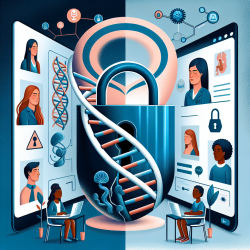The realm of genetic privacy is rapidly evolving, and understanding its implications is crucial for practitioners, including those in online therapy for schools. The research article "The law of genetic privacy: applications, implications, and limitations" by Clayton et al. (2019) provides valuable insights that can enhance your practice. Here, we explore key outcomes from the research and how you can implement them to improve your services.
Understanding Genetic Privacy
The article emphasizes that genetic information is both uniquely individual and widely shared, complicating the issue of privacy. This dual nature necessitates a nuanced approach to privacy protection, balancing individual rights with societal benefits.
Legal Frameworks: HIPAA and GINA
Two significant federal statutes highlighted in the research are the Health Insurance Portability and Accountability Act (HIPAA) and the Genetic Information Nondiscrimination Act (GINA). HIPAA primarily protects health information, including genetic data, by setting standards for privacy and security. GINA, on the other hand, specifically addresses genetic discrimination in health insurance and employment.For practitioners in online therapy, especially those working with schools, it is crucial to ensure compliance with these regulations. This involves:
- Maintaining confidentiality and security of genetic information.
- Ensuring that any use or disclosure of genetic data is in line with HIPAA and GINA requirements.
- Educating staff and clients about their rights under these laws.
Practical Applications in Online Therapy
The research suggests several practical steps that can be integrated into your practice:
- Informed Consent: Ensure that clients understand how their genetic information will be used, stored, and shared. This includes clear communication about the potential risks and benefits.
- Data Security: Implement robust security measures to protect genetic data from unauthorized access. This includes encryption, secure storage, and regular audits.
- Privacy Training: Regularly train staff on privacy laws and best practices for handling genetic information.
Encouraging Further Research
The article concludes that current legal frameworks may not fully protect genetic privacy, suggesting a need for ongoing research and policy development. As a practitioner, staying informed about the latest developments in genetic privacy can help you adapt your practices and advocate for stronger protections.
Conclusion
Implementing the outcomes of this research can significantly enhance the privacy and security of genetic information in your online therapy practice. By staying compliant with HIPAA and GINA, and by adopting best practices for data security and informed consent, you can better protect your clients and improve your services.To read the original research paper, please follow this link:
The law of genetic privacy: applications, implications, and limitations.










